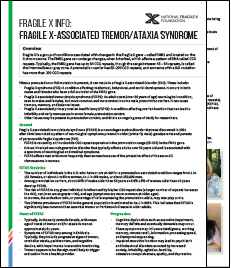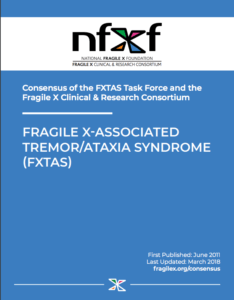FXTAS Resources
The Fragile X-associated disorder, Fragile X-associated tremor/ataxia syndrome, known more commonly as FXTAS (fax-tass) can occur in individuals with the Fragile X premutation. FXTAS is an adult-onset neurodegenerative disorder, more common in males than females over 50 years of age with the Fragile X premutation. FXTAS is associated with tremors, balance problems, and other neurological signs. FXTAS progresses at varying rates in different individuals.
Clinics Specializing in the Treatment of FXTAS
FXTAS clinics are comprised of doctors (primarily neurologists and movement disorder specialists), therapists, researchers, and other specialists who treat FXTAS by utilizing the best available scientific knowledge about the known causes of FXTAS. While there is currently no cure for FXTAS, specialists may be able to lessen the severity and/or slow the progression of symptoms.
Men’s Health & the Fragile X Premutation
From Emory University School School of Medicine, this ebook is organized as a Q&A divided into 4 main sections:
- The Fragile X Premutation: What is it and how does it work?
- Fragile X Tremor/Ataxia Syndrome (FXTAS): What are the symptoms and what should I expect?
- Testing for Fragile X and FXTAS: Who should be tested and how?
- How can I learn more about FXTAS?
From Our Info Series
FXTAS is an inherited neurodegenerative disorder that typically affects adults over 50 years old and is associated with a spectrum of neurological and medical symptoms.
Browse our other available Info Series flyers designed to be easily printable on your home or office printer.
Treatment Recommendations
The goal of therapy for FXTAS is to reduce symptoms and eventually slow the progression of the disease. Management of FXTAS is complex and involves appropriate follow-up by an adult neurologist. It is also important to evaluate other potential causes of dementia such as vitamin B12 deficiency, folate deficiency, and depression.
Webinars
Research Results
Interpreting Clinical Trial Headlines and Announcements in Fragile X Syndrome — Presentation
Explore examples of recent announcements and headlines focused on treatment development in Fragile X syndrome. Presented by Elizabeth Berry-Kravis, MD, PhD, and Craig A. Erickson, MD.
The Progression of Pathology in Longitudinally Followed Patients with FXTAS — Presentation
Learn in this webinar the pathological progression of several longitudinally followed patients with FXTAS at the UC Davis Fragile X Research and Treatment Center.
Experts Discuss Fragile X-Associated Tremor Ataxia Syndrome (FXTAS) — Panel
Explore this premutation webinar to learn more about Fragile X and Associated Tremor/Ataxia Syndrome (FXTAS) with our expert panel: Peter K. Todd, MD, Randi J. Hagerman, MD, David Hessl, PhD, and Dr. Deborah A. Hall, MD.
2022 Industry Updates — Presentation
It's time for our 2022 FXS industry insights. Moderated by Hilary Rosselot, explore research, insights, clinical trials, discussions, and more with presentations by Stela Filipovic-Sadic from Asurage, Stephen O’Quinn from Zynerba Pharmaceuticals, Chad Coberly from Tetra Therapeutics, and Wayne Chadwick from Healx.
Optimal Time Lags From Causal Prediction Model Help Stratify and Forecast Nervous System Pathology
Being able to identify and diagnose possible nervous system disorders by detecting gait problems 15 to 20 years before their clinical diagnosis could help advance treatment development and quality of life.
Prodromal Markers of Upper Limb Deficits in FMR1 Premutation Carriers and Quantitative Outcome Measures for Future Clinical Trials in FXTAS
This system could potentially predict FXTAS onset in premutation carriers who are not showing signs of FXTAS on a neurological exam.
More Resources
Watch: Premutation Disorders & Conditions With Dr. Randi Hagerman
Dr. Randi Hagerman discusses Fragile X-associated conditions and disorders, including FXTAS, and provides strategies for some of their characteristics.
FXTAS 101
An introduction to FXTAS, an “adult-onset” neurodegenerative disorder, usually affecting males over 50 years of age. Females comprise only a small part of the FXTAS population, and their symptoms tend to be less severe. FXTAS affects the neurologic system and progresses at varying rates in different individuals.
Be a part of the solution.
Learn more about the INTERNATIONAL FRAGILE X PREMUTATION REGISTRY and join individuals with the premutation and their families to help advance — and encourage — deeper understanding and research into the premutation condition.
Be a part of the solution.
Learn more about the International Fragile X Premutation Registry and join individuals with the premutation and their families to help advance — and encourage — deeper understanding and research into the premutation condition.












